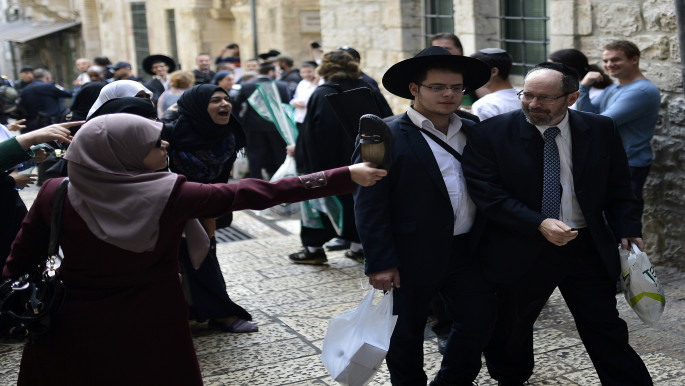
The message of the Jerusalem uprising
A group of Palestinian rebels are using primitive weapons and arousing panic among Israelis and inside the security and military institutions of the Israeli occupation by launching innovative surprise attacks.
What is interesting about these operations is that their perpetrators mostly act individually, and not as part of a larger organisation. This is interesting, especially in view of the situation in the occupied territories and the limited options Palestinians and Arabs have to confront the occupation.
The failure of Oslo
The most important expression of these operations in Jerusalem is frustration at the utter failure of Oslo. It is an eloquent response because of the symbolic significance to the so-called peace process.
| What is interesting about these operations is that their perpetrators act individually, and not as part of a larger organisation. |
For all its promise, Oslo has not produced a satisfactory solution for Palestinians in the West Bank. Moreover, this path continues to suffocate them by expanding the construction of settlements, by turning cities in the West Bank into isolated cantons surrounded by settlements, and undermining hopes for the creation of a real state there.
Settlement building never stopped in the West Bank. The confiscation of land and efforts to displace the Palestinians never faltered. Israel created "facts on the ground", which negotiations did not change. Negotiations became a means of wresting more concessions from Palestinians.
Each and every new fact on the ground advances the Israeli agenda, at the expense of Palestinian claims for a bare minimum.
The Palestinian security forces
For its part, the Palestinian Authority (PA) has not settled for just mismanaging the negotiations or making concessions to the Israelis. It has undertaken to guarantee Israeli security, building up a massive security apparatus of its own in the West Bank, which has been used to choke the military wing of resistance factions and monitor operations that threaten Israeli security.
In his book, Ramallah Dream: A Journey to the Heart of Palestinian Mirage, Benjamin Barthe, the head of the Middle East department of the French newspaper Le Monde, notes that many of the members of the Palestinian police were trained by the US, under the supervision of Generals Keith Dayton and Michael Moeller in a camp located in a suburb in Amman, Jordan.
Recruits pass through three stages: an initial clearance conducted by the Central Intelligence Agency, then filtering conducted by the internal Israeli security apparatus (Shin Bet) and finally a test by Jordanian security. Preparing, training and equipping them are carried out under direct Israeli supervision.
 |
|
| Acts of symbolic defiance are increasing [Anadolu] |
The outcome serves Israeli interests and the prioritisation of Israeli security. The Palestinian police will forget the occupation is the reason for the insecurity they are tasked with controlling.
The recent attacks in Jerusalem are the result of this unfortunate reality. They are the manifestation of Palestinian objections to marginalisation, repression and the privileging of Israeli interests under the Oslo process.
They complement the resistance in Gaza, and though they are limited, they are nonetheless unsettling the occupation and its institutions.
They are also a challenge to the PA security apparatus, which hunts down organised resistance by dismantling the networks it uses to coordinate its activities, confiscates their equipment and curbs their ability to recruit resistance fighters - all in cooperation with Israeli security agencies.
Delusions that the PA security forces can deliver absolute security have been undermined by the rash of individual attacks with improvised weapons like knives or vehicles. These attacks do not require training, and Arab residents of Jerusalem can reach Israeli communities because they hold Israeli identity cards.
Individual, unorganised attacks with primitive weapons do not inflict severe losses on the occupation, but they do have the potential to provoke panic among Israelis.
Israelis cannot rely on their security agencies to protect them against individuals who can, at any moment, attack with an improvised weapon. Before they launch their attacks, these attackers are effectively invisible to the security services, which work to prevent these operations by infiltrating the cells of armed groups.
The symbolism of spontaneous resistance
| Unorganised attacks with primitive weapons do not inflict severe losses, but they do provoke panic among Israelis. |
What is important in these attacks is their symbolic significance. They are spontaneous acts of resistance to the Israeli occupation in Jerusalem and the West Bank, the Oslo process, continued Israeli intransigence and the expansion of settlement activity.
They send the message that Palestinians coerced by the occupying power will not give in, or accept practices that humiliate them or violate their rights. They are expressing their wrath, anger and objection by any means they have at hand. Their actions are part of a long narrative of struggle that does not yield to the power of the occupation and keeps the cause alive from generation to generation.
The leaders who who took Palestinians into this so-called peace process, and the Arab states who supported this process to absolve themselves of further responsibility for Palestine, are the only ones who can act effectively to resolve this impasse.
Resistance has been proved effective, even resistance with limited resources. Under siege, Palestinians resist. They cannot make further concessions because they have nothing left to concede. The concessions made in the Oslo process have led nowhere, and only deepened the oppression that blights Palestinians' daily lives.
Opinions expressed in this article remain those of the original author and do not necessarily reflect the opinions of al-Araby al-Jadeed, its editorial board or staff.
This is an edited translation from our Arabic edition.





 Follow the Middle East's top stories in English at The New Arab on Google News
Follow the Middle East's top stories in English at The New Arab on Google News


